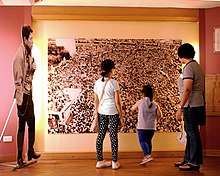Movement of Concerned Citizens for Civil Liberties
The Movement of Concerned Citizens for Civil Liberties (MCCCL) is an advocacy coalition in the Philippines which was first formed under the leadership of Jose W. Diokno in 1971, as a response to the suspension of the Writ of Habeas Corpus in the wake of the Plaza Miranda bombing. It became well known for the series of rallies which it organized from 1971-72, especially the most massive one on 21 September 1972, shortly before the imposition of Martial Law by the Marcos dictatorship.[1]
 Visitors to the Bantayog ng mga Bayani Museum, photographed on August 21, 2018, ponder a photograph of one of the Movement of Concerned Citizens for Civil Liberties (MCCCL) protests of 1972 while a standee of Senator Jose "Ka Pepe" Diokno, looks on. | |
| Formation | 1971 |
|---|---|
| Founder | Jose W. Diokno |
| Type | Advocacy group |
| Location |
|
| Methods | Mass demonstration |
The coalition was reconvened in 2005 and continues to do advocacy work in the Philippines today.
History
With the Constitutional Convention occupying their attention from 1971 to 1973, statesmen and politicians opposed to the increasingly more-authoritarian administration of Ferdinand Marcos mostly focused their efforts on political efforts from within the halls of power.[2] All this changed, however, with the Plaza Miranda Bombing at the Liberal Party Miting de Avance on August 21, 1971.
Ferdinand Marcos blamed communists for the bombing, and used it as a reason to suspend the writ of habeas corpus and have the military pick up prominent activists, such as KM's Luzvimindo David and MDP's Gary Olivar.[1]
Under the leadership of Jose W. Diokno, the Movement of Concerned Citizens for Civil Liberties (MCCCL) - "a broad alliance of civil libertarians, progressive Constitutional Convention delegates, students, professionals as well as workers"[1] was formed to protest the move. As recounted by author and University of the Philippines Professor Petronilo Daroy: "The alliance had three basic demands: a) lift the writ of habeas corpus; b) release of political prisoners; and c) resist any plan by the Marcos government to declare martial law."[1]
The MCCCL's rallies are remembered for their scale, with the biggest one held on September 21, 1972 - just two days before Marcos' announcement of Martial Law - which was attended by as many as 50,000 people. With a specific set of demands, the MCCCL rallies also marked one of the first and most successful events at bringing together "diverse groups such as those from the ‘Nat-Dem’ groups and the ‘Soc-Dem’ groups as well as various civic organizations."[1]
Many of the activists who were active in the MCCCL, was arrested by the Marcos dictatorship when Martial Law was imposed. Diokno himself was one of the 400 individuals on Marcos' "priority list" who were arrested in the early morning hours of September 23, 1972 - before Marcos even announced Martial Law that evening.[3]
2005 Relaunch
While the coalition was effectively dissolved when Martial Law was implemented in late September 1972, it was reconvened in 2005[4] and has since continued to do advocacy work in the Philippines.
See also
- Jose W. Diokno
References
- Daroy, Petronilo Bn. (1988). "On the Eve of Dictatorship and Revolution". In Javate-de Dios, Aurora; Daroy, Petronilo Bn.; Kalaw-Tirol, Lorna (eds.). Dictatorship and Revolution: Roots of People’s Power. Metro Manila: Conspectus Foundation. pp. 1–25.
- Magno, Alexander R., ed. (1998). "Democracy at the Crossroads". Kasaysayan, The Story of the Filipino People Volume 9:A Nation Reborn. Hong Kong: Asia Publishing Company Limited.
- "Martial Law". GMA News Online. Archived from the original on 2009-02-17. Retrieved 2018-06-07.
- Corpuz, Gerry Albert (May 29 – June 4, 2005). "'Undeclared Martial Law' Denounced by Civil Libertarians, Legislators: Cases of military abuse mounting". Bulatlat - The Philippines's alternative weekly magazine. Archived from the original on 2006-11-20. Retrieved 2018-07-13.CS1 maint: date format (link)